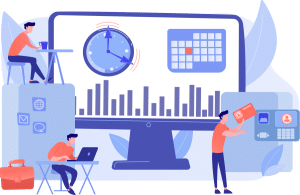Best CRM Software | Top 10 Reviewed and Compared for 2024
With the best CRM software, you can engage, communicate, build, and maintain relationships with prospects and customers. On the whole, CRM tools are key for businesses looking to streamline the recording of prospect information and customer communication. However, with a market jam-packed with options, finding one best suited to your business is no easy feat.
In this guide, we’ve reviewed 10 of the best CRM software providers on the market, including Salesforce, Pipedrive CRM, Zoho CRM, and more. We’ve ranked them based on factors such as price, ease of use, and features — read on as we delve into each one in more depth to discover the one that ticks all the right boxes for you.
Best CRM Software | Top 10 Shortlist
Through extensive research, we’ve found that Salesforce is the best CRM software for 2024 due to its extensive features, phenomenal reputation, and range of plans it offers for various needs and budgets. Besides the almighty Salesforce, here are the market’s best CRM software providers:
- Salesforce — The Best CRM Software for 2024 | Start Your 14-Day Free Trial Today
- Pipedrive — Leading CRM With the Best Sales Features | Get Started With the 2-Week-Long Free Trial
- Zoho CRM — Best CRM for Small Businesses | Try the 15-Day Free Trial Before Committing
- Monday Sales CRM — Most Customisable CRM
- Zendesk Sell — CRM With the Best Layout
- HubSpot — Best Free CRM
- Freshsales — Best CRM for Personalised Customer Engagement
- Maximizer CRM — Best Specialist CRM
- Less Annoying CRM — The Easiest CRM to Use
- Oracle Netsuite — Best CRM for Large Enterprises
Best Customer Relationship Management Software | Top 10 Reviewed
To help you find the one best suited to your needs, we review each of our top 10 in more depth below, including their key offerings, pricing, and pros and cons — let’s dive right in.
1. Salesforce — The Best CRM Software for 2024
Salesforce is one of the leading CRM providers today, and they offer a sophisticated platform that businesses of all sizes can use. It contains all the core features and functionality you’ll need in a CRM.
Inside the platform, you’ll get an overview of your organization’s quarterly performance and an overview from an assistant informing the user of tasks assigned to them.
The assistant also informs users of overdue tasks related to active deals, so your team can easily stay on top of their pipeline.
There are lots of different features for users to explore on that platform. For example, on the opportunities screen, you can get an overview of the current sales opportunities in your pipeline and organize them by their status.

You can toggle the display on the opportunities screen to get a bird’s eye view of how each deal in your pipeline is progressing and get intelligent alerts regarding the status and any issues that occur.
Additionally, as new deals are closed, this data can be used to update sales forecasting in real-time so you and your team can accurately view your pipeline.

There are different plans available aimed at different-sized businesses. For example, the Essential starter plan has Account, Contact, Lead, and Opportunity Management capabilities, including building a customizable sales process.
The plan also includes Email integrations with Outlook and Gmail and the Salesforce App so you can manage your CRM operations on the go. The Essentials plan is suitable for many businesses.
Still, suppose you’re looking for more advanced features, such as sales forecasting, to get an accurate picture of your entire sales pipeline. In that case, you’ll need to consider looking at one of Salesforce’s more advanced plans, such as the mid-tier professional plan.
| Starting Price | Number Of Plans | Best For | Free Trial/Plan | Customer Support |
| $25 | 4 | All Businesses | 14-Day Free Trial | Live Chat, Phone |
Pros
Cons
Pricing
Salesforce offers different plans for different business areas, e.g., for small businesses, marketing teams, and sales teams. For this review, we selected small businesses as our focus. Here are the plans available:
2. Pipedrive — CRM With the Best Sales Features
Trusted by over 100,000 companies in 179 countries, Pipedrive is a CRM that’s suitable for businesses across all industries. During onboarding, you can customize the platform’s setup by selecting:
We selected ‘closing more deals’ as our use case. After setup, you can import your data or use test data provided by Pipedrive to get used to how the platform works. We liked this feature as it helps users get accustomed to how the software operates without the risk of making a mistake using their business’s own data. In addition, with this setup, you can see all your live sales opportunities on the main dashboard organized by their status; this makes it nice and easy to see how your leads are moving down your sales pipeline. On the left-hand side of the screen, you can toggle between screens, including the leads overview screen, another part of the platform that’s very useful for companies using Pipedrive, mainly for sales. On this screen, as you can see in the screenshot below, you can import your existing leads into the platform or use Pipedrive to prospect for new business. You can also use the platform to create web forms, integrate chatbot or live chat to your website, track website visitors, and integrate messaging services with Pipedrive. In addition, on every screen, you’ll find a dog’s head icon on the bottom right-hand side of your dashboard; when you click this icon, you’ll be able to access the Pipedrive knowledge base should you need to. Alongside these features, you can also use Pipedrive to send and receive emails, set up and manage new projects and campaigns, manage your contacts, and view sales insights. Overall, we were very impressed with Pipedrive, it’s a very user-friendly CRM, and its sales features make it easy for a business to manage and track its sales pipeline for maximum profitability. Pipedrive has four plans available:
Zoho CRM is a platform used by 250,000 businesses worldwide. It’s a CRM packed with lead, deal, account, and contact management features to manage your entire customer journey. The platform also offers omnichannel customer management tools such as email integration, chatbot and live chat integration for your website, social media tools and self-service portals, and a host of reporting options. The platform is pleasant on the eye, easy to set up, and nicely laid out. Your main dashboard contains information on the number of deals you have open and your activities, such as the number of calls you’ve made. Additionally, you can see the number of open tasks you have and the meetings you have scheduled. In the top navigation bar, you can filter between different screens to manage your new and existing leads, contacts, meeting, calls, projects, tasks, and more. Zoho CRM contains many features that you may only expect to find with a more expensive CRM. It’s a system well set up for small businesses to enjoy, particularly if you’re starting a new business. As you’d expect, Zoho CRM seamlessly integrates with other Zoho apps, so if you’re an existing Zoho customer, this platform should fit into your current tech stack. Besides the free plan, Zoho CRM has these 4 paid plans available:
Monday Sales CRM is an easy-to-use, customizable platform. If you’re after a CRM that lets you tailor and customize the platform to your needs but don’t have much experience, then Monday Sales CRM could be the CRM for you. Inside the CRM, you’ll find a set of features that work well with one another, helping you to communicate with customers and leads, manage and close deals and track your sales pipeline. You can also import your existing data through various APIs and Excel files. When you first enter the platform, you start by choosing between three templates: Sales CRM, Partnership Management, or Sales Assets. Each template measures a different set of business metrics. When you have your template set, you can drag and drop various tools and features, such as different dashboards and analytics tools, to set up the CRM in a way that’s most useful to your business needs. The CRM is also full of smart automation features that you can add directly to the boards you use to automate manual processes and save time. Overall, the Monday Sales CRM is intuitive, easy to use, and offers flexibility and customizability unseen in many of its competitors. There are 5 plans available for Monday Sales CRM:
Zendesk Sell is an intuitive, modern CRM that, similar to Zoho, contains many of the features that a small business would need in a CRM. Similar to Monday’s CRM, you can customize the look and layout of the platform to your liking. By default, you’ll be able to see your new deals, revenue, tasks, top deals, and more. If you want to edit what you see on the dashboard, all you need to do is press the ‘+ Widget’ button on the top right of your dashboard to add more items to your dashboard. We like this level of customization as it means you can select the information relevant to your business. You can also set up multiple home dashboards, so if you need to customize views to different employees or different regions, you can. On the left-hand toolbar of the dashboard, you can view individual screens dedicated to your leads, deals, tasks, communications, and loads more. Zendesk has also recently rolled out some important features for its CRM. The first is an advanced reporting feature and lead prospecting tools available on the Leads Screen. These features, particularly lead prospecting, are impressive as Zendesk claims to have access to more than 44 million businesses and 350 million contact records within their database – meaning you have a deep pool of information to explore. Zendesk has 4 plans available:
A major player in the marketing and sales world for a while now, HubSpot’s CRM is one of the most popular CRMs around. It’s easy to start with the platform; follow the sign-up steps, enter details about your business, and you’re there. HubSpot’s support team also offers a free onboarding call to help you get set up on the platform, which they’ll contact you about to set up. You can choose to set up a marketing, sales, service, or operations hub inside the platform. You’ll be taken through the setup process step-by-step when you click on any of these tabs. Once set up, you can import your email, messenger platforms, live chat platforms, and forms into your account, and finally, you can import your contacts. There are 12 contact import templates, all varying in complexity, so you can choose which template suits you best. If you don’t have contacts to import, then don’t worry; HubSpot displays two sample contacts in their CRM so you can see how things work. One feature we like within the custom workflows is the ability to segment different email lists; this allows you to get very specific with the type of contact you want to send certain communications to. Within the platform, you’ll also find a dashboard showing you an overview of your active sales pipeline where you can organize your deals depending on their status. You can also view a dashboard that displays different reports and any KPIs you set. The HubSpot CRM is very comprehensive; its sales solutions integrate directly alongside its customer support features, so you can manage the entire customer journey through the platform. It also offers a robust free platform with more features than many paid services, so if you’re a small business after a free CRM to get accustomed, look no further than HubSpot. The pricing for different HubSpot plans mainly depends on the features you want your CRM to contain. As mentioned, HubSpot’s free plan contains many of the features that a lot of businesses will need in a CRM. They also offer a Starter CRM suite with pricing starting at $50/month. If you’re unsure of the exact features you need or are looking for further guidance, we’d advise contacting HubSpot directly so they can recommend a plan that would suit your requirements.
The Freshsales CRM was initially designed as an add-on for the original Freshdesk platform, and it’s an intuitive CRM that, like HubSpot, has a great free plan alongside other paid plans. The onboarding and setup only take a few seconds; enter your email address and company information, and you’ll be taken into the platform. Inside you’ll find numerous dashboards and features to explore. The two central dashboards you’ll spend time in are the activities and sales dashboards, and you can configure both to contain the information you need – which is great for customizing and curating the platform to your liking. We also like the ‘Analytics’ section of the platform; from there, you can run a host of different reports, from monitoring your lead’s website behavior to measuring the success of your marketing campaigns. On the left-hand toolbar, you can navigate to your contacts and accounts, deals, forecasts, documents, and even sales conversations (including inbox, email templates, and sales sequences), amongst other things. Freshsales CRM contains impressive features, and we like how the platform is laid out and how easy it is to navigate to the features you need. The fact that they offer a free plan also means that the platform is open to all businesses of all sizes and budgets, which is great for those small businesses on a tight budget. There are four Freshsales plans available (prices stated are monthly prices):
Maximizer CRM is a specialist CRM aimed at helping sales, marketing, and customer success teams. With an emphasis on sales and growth, Maximizer CRM is beneficial for small and mid-sized companies looking to grow. The interface of Maximizer CRM won’t win any beauty awards, but it does contain many valuable features, particularly sales, marketing, and business intelligence tools. For example, users can view their open opportunities, leads, address book, and calendar. Inside the address book, screen users can customize sales pipelines for different partners or types of sales. Customizable pipelines are one of the platform’s stand-out features and allow sales leaders to personalize their sales process. In addition, it’s beneficial for larger sales teams that work on different types of deals that may have different sale cycles. Users can then use their sales pipeline data for forecasting purposes to get an accurate picture of their active sales progress. The platform has pre-built email templates that marketers can make the most of. Users can also add their branding to emails to give them a more professional look. Users can also track analytics of any campaigns they run and use this data for forecasting purposes and campaign predictions, which can all be viewed from within the Maximizer CRM interface. The sales and marketing automation features, such as email scheduling and the ability to use pre-built email templates, are stand-out features of Maximizer CRM. Sales and marketing teams can use these tools to save time and use the platform’s advanced analytics and reporting features to measure their success and track KPIs. Maximizer CRM has just two plans available:
As the name suggests, the Less Annoying CRM is designed with ease of use and simplicity in mind. When you sign up for the service, you’ll come to a beginner’s guide where you can watch in-depth videos showing exactly how each feature the platform contains works. These explainer videos are handy for those users who prefer to see how the platform works before testing it out. The ‘Your Workspace’ dashboard is where you’ll likely spend most of your time with the Less Annoying CRM; on this dashboard, you can add new contacts, companies, events, and tasks. You can also view an overview of your sales pipeline and any due tasks. On the left-hand navigation bar, you’ll find individual dashboards for your contacts, calendar, reports, and settings. The platform itself is straightforward to use and navigate, as the business has just focussed on the core features you need in a CRM; you don’t feel like you’re getting lost in features that you’ll never use, which can sometimes be the case with more complex CRMs. The platform’s focus on core features is both a strength and a weakness. It’s straightforward to use, and if you’re a sole trader or you run a small business, then the Less Annoying CRM contains all the features you need. However, for a growing, mid-sized or larger company, the Less Annoying CRM may not be suitable as it doesn’t contain some of the more advanced features that larger organizations require in a CRM. Less Annoying CRM offers one simple pricing plan:
Oracle NetSuite CRM is one of the most advanced CRMs available. The platform contains features to help organizations of all sizes manage the entire customer journey, such as sales force automation, customer service management, and marketing automation, plus features to manage quotes, map sales forecasts, and operate partner relations. The platform is intuitive, and it’s easy enough to navigate between different dashboards. Sales teams will spend most of their time in the activities, leads, and opportunities screens to manage their pipeline. Marketing teams can use the platform to build, execute and measure marketing campaigns, while customer service teams can use Oracle NetSuite to create and automate case management and review and reply to customer communications. The platform also has useful reporting and analytics features that users can utilize. For example, sales teams can monitor lead-to-close times and lead-generation patterns. Marketing teams can monitor website visitor activity, while customer service teams can monitor metrics such as call volume, call resolution times, and other customer-related KPIs. The pricing for Oracle NetSuite’s CRM is custom, so you’ll need to contact the provider for a quote.
There are many benefits CRM software can bring to business owners and sales teams. Here are some of the key benefits: CRMs help organizations streamline their sales processes. By having clear visibility into their sales pipeline and tracking the progress of each deal, business owners and sales teams can: Many businesses put a lot of effort into gaining new customers only to neglect their customer retention efforts. If this is or has been the case for your business, then you’ll be pleased to hear that the right CRM software can help cut your customer churn and improve your retention. Many CRM platforms contain customer support features such as automated ticketing services, chatbots, and live chat technology. Some contain advanced features like sentiment analysis and user behavior technology to help identify customers at risk of churning. Features like live chat or chatbots can also help you service more of your customers in less time and solve customer queries more efficiently. Improved customer retention also helps business owners increase their revenue; research suggests that increasing customer retention by 5% can increase a company’s profits by as much as 25% – 95% — need we say more? Most CRM software contains features that can automate manual parts of a sales process. For example, some sales CRM providers, such as Freshsales, offer email sequences and templates inside their CRM. Sales teams can use these sequences to automate parts of their email lead generation, saving them time that they could spend elsewhere. Also, most sales CRMs allow users to make calls and send emails and SMS directly from the CRM, meaning that sales teams can carry out all of their communication with prospects directly from their CRM rather than relying on multiple platforms. There’s a lot to think about when choosing the best CRM software for your business. Here are some of the critical things you’ll need to consider: Different CRMs work better for different-sized businesses. For example, there are a few providers, such as Salesforce, who have plans available for every business size. In contrast, some providers, such as Less Annoying CRM, are more suited to smaller businesses. In general, if you’re running a small business, a CRM such as the Less Annoying CRM, Zoho CRM, or HubSpot’s free CRM could be a good fit. Whereas, if you’re running a midsize or large business, consider a solution such as Oracle NetSuite. Similar to the size of your business, the goals or problems you want to solve with a CRM will go some way to determining your selection. For example, if you want a new CRM to improve your sales, you’ll want to focus on CRMs with prominent sales features such as Pipedrive, Freshsales, and HubSpot. Or, if you’re looking for a CRM that can manage your entire customer workflow covering sales, marketing, and customer service, consider a solution such as Oracle NetSuite. Some of the common goals you may have when selecting a CRM are: Anytime you introduce new software or a new platform into your tech stack, you must consider implementation. For example, if you’re implementing a complex CRM into your tech stack, you might need a platform specialist to help you with implementation. Or, if you’re already using a product from a provider that also offers a CRM solution, you may need to look at how the two solutions implement together and how these integrations fit with your existing workflows. Another key implementation element will be user adoption and training; you’ll need to consider the number of users using the CRM and how they’ll be trained on the platform. CRM training will usually entail an account manager onboarding your users onto the platform and running training sessions for your users. You should now have a good idea of the different CRM software solutions available today and be well set to choose a provider and a plan that’s best suited for your business. Our top pick for the best CRM software for 2024is undoubtedly Salesforce. The CRM contains a host of sales, marketing, and automation features that all businesses can use to streamline their workflows and improve their operations. It’s also got a good range of plans to pick from packed with different features for you to choose from.


Starting Price
Number Of Plans
Best For
Free Trial/Plan
Customer Support
$19.90
4
Businesses Needing a Sales CRM
14-Day Free Trial
Live Chat, Email
Pros
Cons
Pricing
3. Zoho CRM — Best CRM for Small Businesses


Starting Price
Number Of Plans
Best For
Free Trial/Plan
Customer Support
Free
5
Small Businesses
Free Plan/15-Day Free Trial
Email, Phone
Pros
Cons
Pricing
4. Monday Sales CRM — Most Customisable CRM

Starting Price
Number Of Plans
Best For
Free Trial/Plan
Customer Support
$25
4
All Businesses
14-Day Free Trial
Live Chat, Phone
Pros
Cons
Pricing
5. Zendesk Sell — CRM With the Best Layout

Starting Price
Number Of Plans
Best For
Free Trial/Plan
Customer Support
$25
4
Businesses Wanting a CRM With an Easy-to-Use Layout
14-Day Free trial
Live Chat
Pros
Cons
Pricing
6. HubSpot — Best Free CRM


Starting Price
Number Of Plans
Best For
Free Trial/Plan
Customer Support
Free
2 (Custom Plans Also Available)
Any Business Looking for a Comprehensive Free CRM
Free Plan
Live Chat, Phone
Pros
Cons
Pricing
7. Freshsales — Best CRM for Personalised Customer Engagement

Starting Price
Number Of Plans
Best For
Free Trial/Plan
Customer Support
Free
4
Businesses Purchasing a CRM to Improve Customer Relations
Free Plan, 14-Day Free Trial
Phone, Email, Contact Form
Pros
Cons
Pricing
8. Maximizer CRM — Best Specialist CRM

Starting Price
Number Of Plans
Best For
Free Trial/Plan
Customer Support
$55
2
Businesses Needing a Specialist Sales and Marketing CRM
N/A
Live Chat, Phone, Email, Contact Form
Pros
Cons
Pricing
9. Less Annoying CRM — The Easiest CRM to Use

Starting Price
Number Of Plans
Best For
Free Trial/Plan
Customer Support
$15
1
Small Businesses Looking for an Easy to Use CRM
30-Day Free Trial
Phone, Email, Contact Form
Pros
Cons
Pricing
10. Oracle NetSuite — Best CRM for Large Enterprises

Starting Price
Number Of Plans
Best For
Free Trial/Plan
Customer Support
Custom
Custom
Large Enterprises
N/A
Email, Phone
Pros
Cons
Pricing
Best CRM Tools | Top 10 Compared
CRM Software
Starting Price
Best For
Free Trial/Plan
Customer Support
Salesforce
$25
All Businesses
14 Days
Chat Bot, Phone
Pipedrive
$19.90
Businesses Needing a Sales CRM
14 Days
Live Chat, Email
Zoho CRM
Free
Small Businesses
15 Day Free Trial/Free Plan
Email, Phone
Monday Sales CRM
$7.50
Custom
N/A
Not Stated
Zendesk Sell
$25
Businesses Prioritising Ease of Use in a CRM
14 Days
Live Chat
HubSpot
Free
Businesses Looking for a Robust Free CRM
Free Plan
Live Chat, Email, Phone
Freshsales
Free
Businesses Purchasing a CRM to Improve Customer Relations
Free Plan/14 Day Free Trial
Phone, Email, Contact Form
Maximizer CRM
$55
Businesses Looking For A Specialist Sales and Marketing CRM
N/A
Live Chat, Phone, Email, Contact Form
Less Annoying CRM
$15
Small Businesses Looking for an Easy to Use CRM
30 Days
Phone, Email, Contact Form
Oracle Netsuite
Custom
Large Enterprises
N/A
Phone, Email
The Key Benefits of CRM Software for Business Owners and Sales Teams
Increased Sales and Profits
Improved Customer Retention
Improves Sales Team Productivity
How to Choose the Best CRM Software for Your Business
Think About the Size of Your Business
Identify Your Goals
Consider Implementation
CRM Tools FAQs
What’s the best CRM software in 2024?
What’s the most commonly used CRM software now?
Is there a better CRM than Salesforce?
Which CRM is the easiest to use?
What’s the best free CRM software?
What’s the best CRM tool for small businesses?
Conclusion | What’s the Best CRM Software in 2024?
Our Editorial Process























